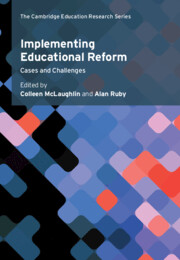Book contents
- Implementing Educational Reform
- Implementing Educational Reform
- Copyright page
- Contents
- Figures and Tables
- Contributors
- Preface
- 1 Why Focus on Implementation in Education Reform?
- 2 Promoting Equity in Education through System Change
- 3 A Decade of Reform in Hong Kong
- 4 Reforming a Whole School System
- 5 The Challenges and Opportunities of Greater Autonomy for Post-Soviet Universities
- 6 School Improvement by Design
- 7 Promising Practice in Government Schools in Vietnam
- 8 Reform Implementation Lessons
- 9 Qatar’s Road to Education Reform
- 10 Implementing Educational Reform
- Index
- References
9 - Qatar’s Road to Education Reform
The Need for Teacher Autonomy
Published online by Cambridge University Press: 19 November 2021
- Implementing Educational Reform
- Implementing Educational Reform
- Copyright page
- Contents
- Figures and Tables
- Contributors
- Preface
- 1 Why Focus on Implementation in Education Reform?
- 2 Promoting Equity in Education through System Change
- 3 A Decade of Reform in Hong Kong
- 4 Reforming a Whole School System
- 5 The Challenges and Opportunities of Greater Autonomy for Post-Soviet Universities
- 6 School Improvement by Design
- 7 Promising Practice in Government Schools in Vietnam
- 8 Reform Implementation Lessons
- 9 Qatar’s Road to Education Reform
- 10 Implementing Educational Reform
- Index
- References
Summary
This article explores the setting up of Independent Schools in Qatar as part of the response to the Education for a New Era (EFNE) reforms that were designed to focus upon improving the quality of education and equipping young people with the skills needed to participate in a knowledge-based economy. RAND had undertaken an assessment which identified the key factors to develop autonomy, accountability, variety and choice. The initiative was evaluated as not having met its goals and this chapter explores the factors that played a part in the successes and challenges, alongside giving an historical account of Qatar’s education system and its development. There is also discussion of the Empowering Leaders of Learning programme.
- Type
- Chapter
- Information
- Implementing Educational ReformCases and Challenges, pp. 171 - 192Publisher: Cambridge University PressPrint publication year: 2021
References
- 1
- Cited by



